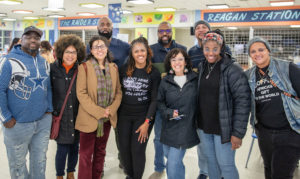The National Day of Racial Healing (NDORH) is an annual, nationwide observance that takes place on the Tuesday following Martin Luther King, Jr. Day. Events across the country engage families, schools, businesses, and communities in racial healing activities with the goal of creating a more just and equitable future for our children.
In January 2024, the Hogg Foundation celebrated its second annual NDORH event in partnership with Austin Justice Coalition, a local nonprofit dedicated to improving the quality of life for poor people in the Austin community. Despite the wintry weather, we welcomed a gathering of more than 80 community members to take part in facilitated dialogues, fellowship, music, food, and artistic expression.
In this episode we speak with the facilitators of this year’s celebration, Dr. Mary Rice-Boothe, EdD. and Dr. Angela Ward, PhD. Mary is with The Leadership Academy, a nonprofit organization that provides leadership development, coaching, and support to build the capacity of individuals and systems to be culturally responsive and give every student access to challenging and engaging learning experiences. Angela is the founder and CEO of 2Ward Equity, a leadership consulting organization specializing in person-centered learning, coaching, and organizational capacity-building to create identity-safe spaces and improve the experiences of staff.
Overcoming Generational Trauma
As a Black woman, Mary Rice-Boothe recognized an unwelcome pattern. She saw experiences of racial oppression shared across generations. Her experiences mirrored those of her mother. Likewise, her daughter’s experiences mirrored her own.
“I asked myself how I could be part of working to dismantle that intergenerational oppression and how I could make sure I had the tools I needed to actually get that work done.’” says Mary.
With her personal experience as a starting point, Mary broadened her professional role as an educator to become a facilitator and a researcher.
“I wanted to go deep into asking ‘What does research look like around racial healing?’” says Mary.
For Angela, learning extensively about the school-to-prison pipeline as a college student and witnessing its impact firsthand in her community led to her professional focus on removing barriers.
“I sang in a choir as a young adult. When we visited a prison to perform, I saw the faces of people I had gone to Vacation Bible School with as a child,” says Angela. “I ended up teaching first grade because I deeply understood the school-to-prison pipeline. It’s been pretty much my life’s work to make sure that educationally I’m doing everything I can to break it.”
Focusing on relationship-building, Angela also expanded her work beyond the classroom to become an instructional coach, a coach of superintendents, and a coach of directors of professional learning.
“My goal has always been to help teachers and administrators find a space within themselves to humanize the children that otherwise end up as ‘widgets’ on a spreadsheet.”
Creating the Vision
Angela and Mary generously brought their expertise and enthusiasm to this year’s NDORH celebration.
“I was excited to be a part of this event because of its connection to MLK Day and because of its focus not on retraumatizing, but on healing,” says Mary.
As she and Mary prepared, they talked about what it would look like and sound like and feel like inviting people into this space, says Angela.
“Both of us thought of the word ‘love.’ We wanted to focus on the words ‘love’, ‘healing,’ and ‘connection.’ Those three words became the focal point of how we would invite people in.”
Guided by this focus, Angela and Mary facilitated a full day of engaging dialogue, healing circles, and creative activities.
Defining Success
Angela and Mary recognize that true racial healing calls for ongoing work and won’t be accomplished with a single conversation or a single event. At the same time, they feel hopeful.
“One day is not going to make the transformation,” says Mary. “But one day will hopefully generate interest in what was heard and what was experienced. Hopefully it will encourage people to say ‘How do I keep going? How do I keep doing this for myself, for my community, and beyond?”
Related Content
- The Leadership Academy
- Hogg Foundation Declaration of Racism as a Mental Health Crisis
- Co-Signer Spotlight: Mindful Philanthropy
- Co-Signer Spotlight: People’s Community Clinic
- 3 Things to Know: Cultural Humility
- Brave Spaces for All
- To My White Girlfriends
- Hogg Foundation Statement on George Floyd, Racial Violence, and Systemic Racism

